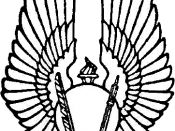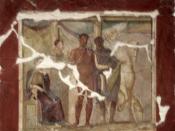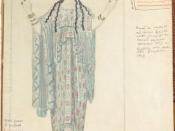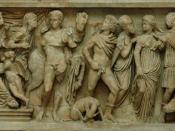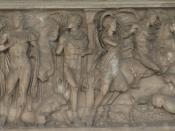ÃÂHonesty is the best policy,ÃÂ this well know statement not even followed by itÃÂs preachers nowadays holds close to no value in the minds of most today. Honesty seems to have faded to the back of our minds allowing us to forget of its importance and find justification in every lie we tell, and not until a lie generates a negative effect will it be deemed unjustified and immoral.
Truth throughout time has been deemed highly respected and at times in small anecdotes able to save someoneÃÂs life. In the story of Joseph, the boy with a robe of many colors, betrayed by his brothers and sold, believes his brothers are lying when they, pleading for grain to feed all their family, tell him of all their family including their youngest brother. Joseph, then second-in-command to Pharaoh, also the youngest in their family as he recalls, so "On the third day Joseph said to them, ÃÂDo what I say and your lives will be spared, for I am a godfearing man: if you are honest men, only one of you brother shall be kept in prison, while the rest of you may go and take grain for your starving households; but you must bring your youngest brother to me.
In this way your words will be proved true, and you will not dieÃÂ" (Genesis 42: 18-20) With this they left and they did come back with their youngest brother, as it appears another had been born after Joseph was betrayed and sold. This depicts the importance of truth in some cultures. Truth can do so much as to save someoneÃÂs life. Truth can be found vitally important in most cultures however it is easily disregarded.
I overheard a conversation once in which the words ÃÂtruth is the cornerstone of any successful relationship,ÃÂ were mentioned. Intrigued I wondered which type of relationship they were discussing and if it pertained to, or held true, in a parent/child relationship. Take a three year old child whose beloved pet dog has just been run over. This child approaches his mother and asks for the whereabouts of his dog. His mother determines her child to be too young to learn of death. Instead, she decides to tell him the dog has been taken to a farm where it will be happy and better off. Would the truth ten be essential in this relationship? The mother seems to simply bend truth to what will benefit her. Her dishonesty will be disregarded at the time since it seems to not cast any negative effect over anyone; the mother lives on more at ease knowing she has escaped a very difficult conversation and the child will sleep better at night thinking his dog is safe and happy.
Ancient Greek tragedies seem to be filled with countless examples in which truth remains censored as in the story of a little boy and his mother. One such tragedy, Hippolytus, includes the line, ÃÂTruth unseen, nor yet dark with the brand of a lie.ÃÂ (Hippolytus, 1210) this single line seems to prove prominent among many in the ability to convey an important message. In this ancient greek tragedy a goddess attempts to destroy Hippolytus by making his stepmother, Phaedra, fall in love with him in an awkward turn of events. The truth of PhaedraÃÂs love for Hippolytus and her vengeful plan has not come to light and goes unseen by Theseus, however it has not yet been given the quality of being evil or ÃÂdarkÃÂ because it hasnÃÂt been revealed to Theseus, or at least he does not believe, that what she claims is a lie. This sort of paradigm may be applied to situations taday.
Everyone has lied to their parents at least once in their lives, and most have hidden a report card as well. I remember when I got my first ÃÂD;ÃÂ completely horror stricken, and with no idea on what to do, I hid it, I figured my parents simply could not find out. My plan seemed perfect, I would hide the report card and then I would bring up my grades in time for the next quarter and they would never find out I had a ÃÂDÃÂ and all would be well in my world. The truth lingered unseen by my parents and since the truth had not come to light they did not brand me a liar; however circumstances change and my mother found my report card. In my defense I deemed my action justified because I wanted to spare them of any stress and that I had brought up the grade. My mother found it completely unjustified simply because of the fact I lied and did not tell her. Justification was then left up to the suitor as it is in any case.
ÃÂIf you do well, you hold your head up; if not sin is a demon crouching at the door; it will desire you, and you will be mastered by it." (Genesis 4:7) This seems to be a wonderful piece of advice however few follow it and are consumed in sin. Taking religion aside interpret and interpreting sin as lies this verse seems to tell us to do right and speak truth or else we will be consumed in lies. Honesty and dishonesty have been taken and now hold a variable of meanings and values depending on the person questioned. Someone will always find justification in what they say and then again someone will find it unjustified, truth is then molded to fit oneÃÂs own thoughts and purpose.
Works CitedBible. Oxford University Press, 1989Euripides. Hippolytus, translated by Gilbert Murray. Vol. VIII, Part 7. The Harvard Classics.
New York: P.F. Collier & Son, 1909ÃÂ14; Bartleby.com, 2001. 16 Nov 2008
